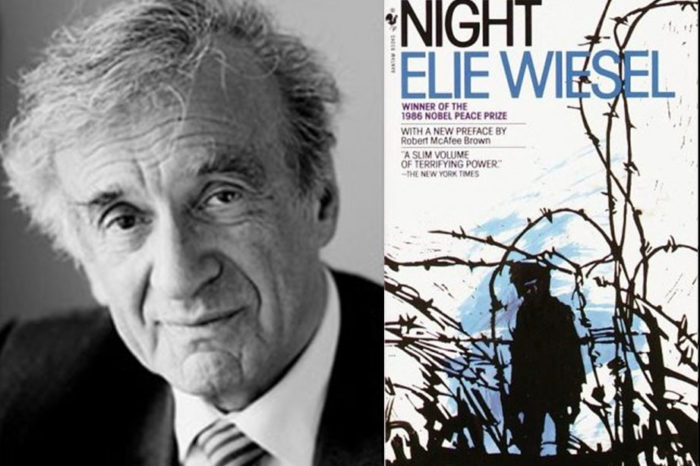Op-ed: Teaching children assures that we will never forget
This op-ed appeared in the The Berkshire Eagle, the Fall River Herald News, the Taunton Daily Gazette. The Federalist, the MetroWest Daily News, the New Bedford Standard-Times, and The Springfield Republican.
“Never shall I forget that night, the first night in camp, which has turned my life into one long night…,” wrote Nobel Peace Prize-winning Holocaust survivor Elie Wiesel in his memoir, “Night.” “Never shall I forget the little faces of the children, whose bodies I saw turned into wreaths of smoke beneath a silent blue sky.”
This fall marks the 70th anniversary of the Nuremberg Trials, when the Allied victors of World War II and their International Military Tribunal prosecuted and handed down verdicts on the atrocities of Nazi war criminals. President Harry Truman sent U.S. Supreme Court Justice Robert Jackson to serve as the chief American prosecutor.
Nuremberg, Germany – the infamous epicenter of the Nazi Party rallies, and the place where, in 1935, Adolph Hitler promulgated the Nuremberg Laws, codifying and institutionalizing his anti-Semitic policies – was selected as the symbolic location for the trials.
During the Nazi genocide from 1939 to 1945, six million European Jews were murdered. According to historians, this constituted nearly two-thirds of the Jews on the Continent, including 90 percent of the Jews in Poland, and 1.5 million children.
Disturbingly, most American high school students don’t know much U.S. history, let alone the basics of the World War II era.
Students today need to understand and remember the realities of the Holocaust and the evil found within human nature. History teaches us how quickly Europe’s oldest, most cultured nations stooped before totalitarian regimes, ushering in WWII, which claimed over 50 million lives.
“Germany in the 1930s was the best-educated nation in the world,” said noted Harvard psychiatrist Robert Coles. “And look what it turned to – submitted to the will of a mass murderer. [This should] make one a bit skeptical about knowledge with a capital ‘K’ in the secular sense.”
As Icchak Arbeiter told his sons in 1942, shortly before being killed at Treblinka, “Children, go over there, save yourselves and if you survive, remember to carry on Jewish life and Jewish traditions.” Today, his son Israel “Izzy” Arbeiter lives in Newton, MA. He grew up in Plock, Poland and survived several Nazi extermination camps, including Auschwitz-Birkenau. Izzy’s lifework has been to honor the memory of his family.
This history is closer to us than we think, and over the last 70 years, award-winning Holocaust historians such as Saul Friedländer have documented the world’s most terrifying example of human injustice.
I read Elie Wiesel’s Night in high school, which was a major reason I attended Boston University, where he taught. I was fortunate enough to hear Professor Wiesel speak on campus numerous times. I was struck by his calm, philosophical, and sage manner when discussing the horrifying details of his experiences at Auschwitz and Buchenwald, including the cattle cars, barbed wire fences, and crematoria.
This past spring, only a couple months before he died, I had a final opportunity to see him speak at an event on religious freedom in New York City. To hear Elie Wiesel was to hear the deliberative defiance and wisdom of a prophet.
Our schoolchildren also need to learn Wiesel’s wisdom, but they largely don’t. His book Night is not an “exemplar text” in the nationalized K-12 standards, Common Core. Further, in 2014 American students’ performance was mediocre on the eighth-grade civics portion of the National Assessment of Educational Progress, known as the “nation’s report card.”
Despite the post-World War II pleas to “never forget,” we are forgetting, and so are our children.
Massachusetts has what academic experts consider to be the nation’s leading K-12 history standards. But seven years ago, Governor Deval Patrick dropped the U.S. history test as a high school graduation requirement, and Charlie Baker has yet to deliver on his 2014 campaign promise to make history a priority in the Bay State’s schools.
“We must always take sides. Neutrality helps the oppressor, never the victim,” Elie Wiesel said in his 1986 Nobel Acceptance Speech. “Silence encourages the tormentor…”
Drawing moral courage from Holocaust survivors such as Elie Wiesel, Izzy Arbeiter, and the memory of the six million Jews who did not survive Hitler’s tyranny, we should hold all education officials accountable for teaching and remembering the historic lessons of our civilization. That way we will truly, never forget.
Jamie Gass directs the Center for School Reform at Pioneer Institute, a Boston-based think tank.



